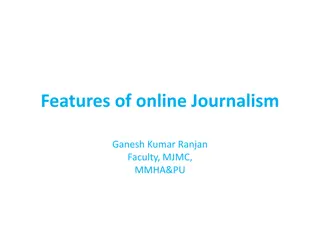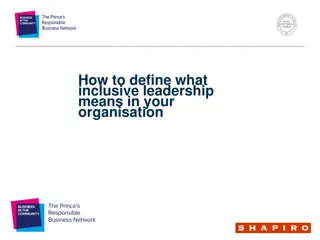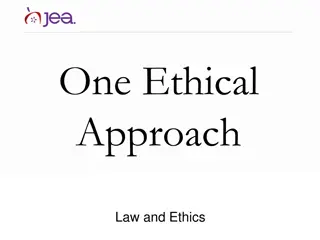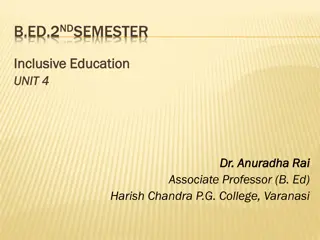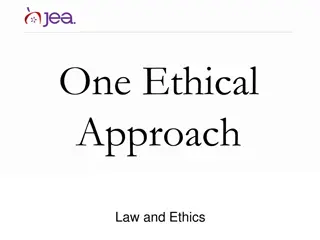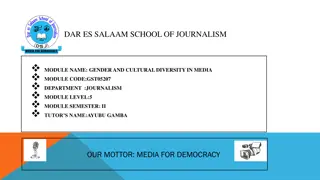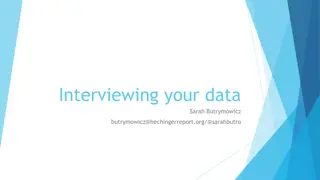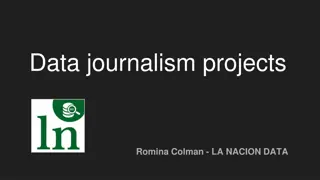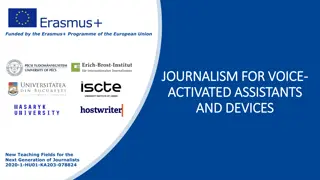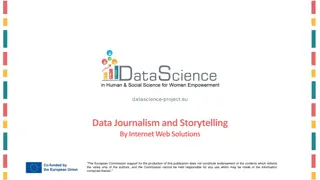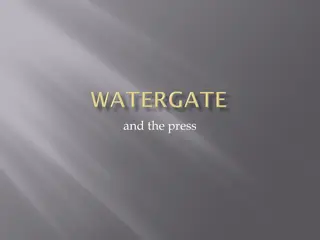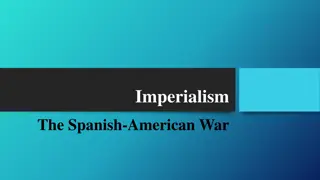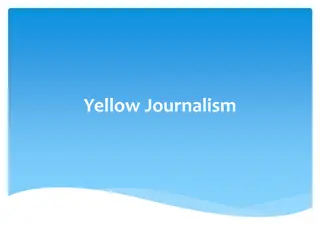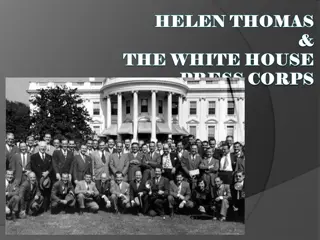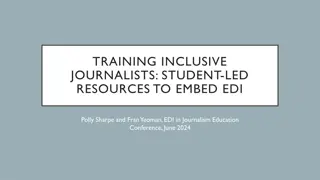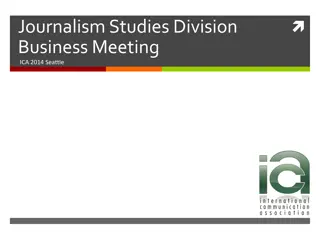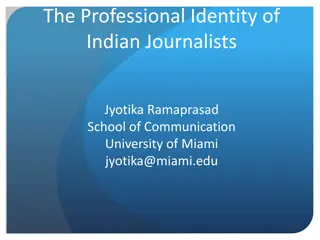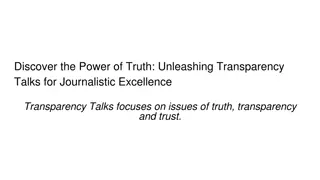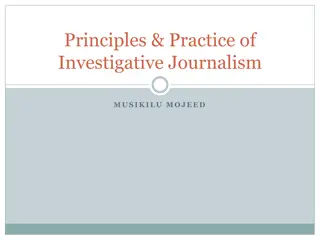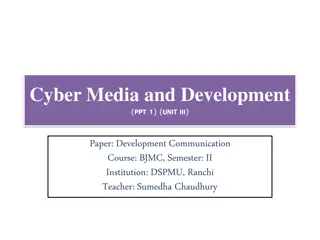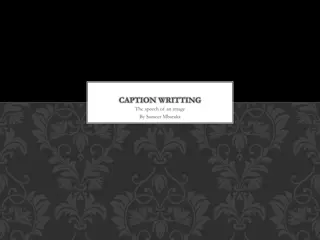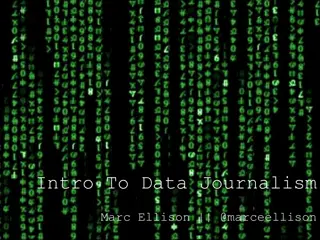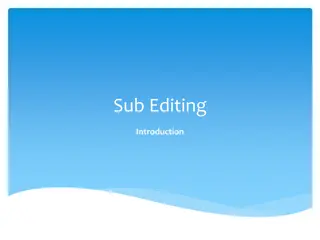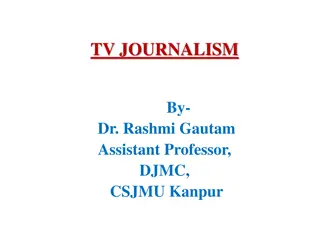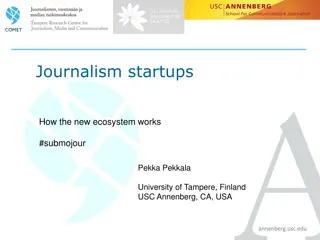NPA Level 6 Journalism Course Overview
This NPA Level 6 Journalism course is designed for students aiming to enhance their journalism skills either as a stepping stone to Higher English or to delve into modern journalism practices. The course covers research, interview skills, feature and news writing, and layout design, providing a comp
0 views • 16 slides
Exploring Citizen Journalism and Non-Fiction Writing
Explore the world of citizen journalism and non-fiction writing, learning about text types, adapting writing to conventions, considering audience, purpose, and tone. Discover the significance and usefulness of non-fiction writing, and delve into creating various text types. Uncover the role of citiz
1 views • 11 slides
Best service for Videography in Riverwoods
Vision Works And Industries LLC serves the Best service for Videography in Riverwoods. He is dedicated to providing top-notch service and breathtaking imagery. Skilled in film direction, communication, video journalism, and journalism, wedding photography, portrait photography, commercial photograph
0 views • 6 slides
Enhancing Inclusive Practices in Physical Education for Children with SEND
Explore strategies and resources to promote inclusive physical education for children with special educational needs and disabilities. Learn how to adapt lessons, create an inclusive environment, and develop social, personal, and physical skills for all students. Gain insights into inclusive models
0 views • 14 slides
Understanding the Features of Online Journalism by Ganesh Kumar Ranjan
Online journalism features hypertextuality, interactivity, multimediality, and immediacy. Hypertext enables multi-linearity and multi-vocality, changing the narrative paradigm. Active reading allows readers to navigate content with flexibility, though it may challenge authors’ control. Ganesh Kuma
0 views • 7 slides
Understanding Inclusive Leadership and its Key Competencies
Inclusive leadership entails harnessing the strengths of a diverse workforce to drive organizational success. It involves motivating and inspiring individuals from various backgrounds, fostering adaptability, developing diverse talent, and building inclusive relationships. The three key competencies
0 views • 8 slides
Red Light vs. Green Light Ethics in Journalism: A Critical Analysis
Exploring the ethical nuances between Red Light and Green Light approaches in journalism ethics through real-life situations and expert insights. The debate between caution and courage, restrictions and freedoms, and the impact on journalistic practices and societal perceptions are examined in depth
0 views • 13 slides
Creating an Inclusive School: Evolving Education Management for Equal Opportunity
In this unit on Inclusive Education, Dr. Anuradha Rai discusses evolving educational management at the school level from an inclusive perspective. The focus is on addressing physical, mental, social handicaps, and educational disabilities through policy frameworks. Emphasizing the importance of incl
0 views • 23 slides
Ethical Approaches in Journalism: Red Light vs. Green Light Ethics
Explore the contrasting perspectives of Red Light and Green Light ethics in journalism, where Red Light focuses on caution and restraint while Green Light emphasizes action and opportunity. Dive into the nuances of ethical decision-making in journalism and consider the impact of language on ethical
0 views • 13 slides
Inclusive and Special Education: Impact and Evolution in Canada
Explore the journey of inclusive and special education in Canada, from historical milestones to current challenges. Delve into the concept of inclusive education and its impact on students with disabilities, supported by a comprehensive curriculum. Discover the evolving role of educators and the str
2 views • 19 slides
Understanding Online Journalism: Definition, Characteristics, and Types
Online journalism encompasses various forms of media based on telecommunication and multimedia, such as websites, online radio, and TV. It involves the convergence of sound, image, and text to provide factual, contextual, and subdivided content. This type of journalism is not confined to news writin
0 views • 31 slides
Cultural Diversity and Journalism Practices
Cultural diversity in journalism is essential for recognizing, respecting, and valuing different cultural expressions. It promotes empowerment, contribution from diverse groups, and celebrates differences. The importance of cultural diversity in journalism lies in acknowledging the variety of cultur
0 views • 9 slides
Evolving Landscape of Journalism in China's Digital Age
Exploring the changing dynamics of journalism in China's digital era, this study delves into the role of journalists and media models in disseminating information and guiding public opinion. It assesses the social functions of journalism in major cities, analyzing the perspectives of 146 journalists
0 views • 14 slides
Unveiling the Power of Data in Journalism
Exploring the crucial role of data in journalism, this content guides on utilizing data for story ideas, focus, context, and fact-checking. Learn the significance of approaching data with an open mind, conducting initial exploration, and finding compelling story ideas. Discover how to analyze and in
0 views • 9 slides
Data Journalism Projects and Best Practices: A Comprehensive Guide
Dive into the world of data journalism with insights on idea generation, fact-checking, campaign finance data in Argentina, researching effectively, and verifying information. Discover how to approach data journalism projects with a critical eye and attention to detail.
0 views • 31 slides
Freedom of Media and Ethics in Journalism: A Critical Examination
This presentation delves into the complex issues surrounding freedom of the media, particularly in the context of sensitive topics like picturing Muhammad. It explores the foundations of freedom of the press, international declarations, regulations, and the ethical considerations involved. The cases
0 views • 25 slides
Exploring the Role of Voice-Activated Devices in Journalism Education
This course funded by the Erasmus+ Programme delves into the use of voice-activated devices and assistants in media and journalism. Lessons cover history, practical applications, limitations, and the current state of these technologies. Expert authors provide insights on innovation skills, problem-s
0 views • 35 slides
Exploring the Evolution of Data Journalism in the Digital Age
Data journalism has transformed from a set of numbers on a spreadsheet to a powerful tool for storytelling in the digital era. This innovative approach utilizes data to make complex stories accessible and engaging for readers, revolutionizing the way news is produced and consumed. Embracing data jou
0 views • 20 slides
The Watergate Scandal: A Turning Point in Journalism and Government
Watergate has transcended as a term for major scandals, but it originally referred to the 1972 burglary in Washington that set off a chain of events leading to significant changes in journalism and governance. Young reporters Carl Bernstein and Bob Woodward's relentless pursuit of the story, aided b
0 views • 27 slides
Causes of the Spanish-American War: Imperialism, Cuba, and Yellow Journalism
The Spanish-American War was fueled by imperialism, particularly the desire for colonies, as well as the unrest in Cuba against Spanish rule. American economic interests in Cuba, coupled with yellow journalism's sensationalized reporting, further escalated tensions leading to the conflict.
0 views • 25 slides
The Spanish-American War: Origins and Impact
The Spanish-American War was fueled by a combination of factors including economic struggles, imperial ambitions, and sensationalist journalism. Theodore Roosevelt's stance on war, coupled with the desire for Cuba's independence from Spain, led to a call for war in the late 1890s. Yellow journalism
0 views • 18 slides
The Legacy of Yellow Journalism: Joseph Pulitzer and the New Era of Press
In the early era of the press, yellow journalism emerged as a colorful and sensational form of news reporting, popularized by publishers like Joseph Pulitzer and William Randolph Hearst. Pulitzer, an immigrant to America, championed accuracy and public causes through his newspapers, such as the St.
0 views • 15 slides
Helen Thomas and the White House Press Corps: A Legacy of Journalism
The White House Press Corps, a group of journalists covering White House news, plays a crucial role in informing the public and holding the administration accountable. Helen Thomas, a trailblazing journalist and the first female member of the White House Correspondents Association, broke barriers fo
0 views • 15 slides
Student-Led Resources for Inclusive Journalism Education
Explore student-led resources aiming to embed Equity, Diversity, and Inclusion (EDI) principles in journalism education. Discover the challenges faced by aspiring journalists and how these resources help build confidence, understanding, and inclusive reporting practices. From diversity reporting gui
0 views • 11 slides
Highlights of ICA Journalism Studies Division Business Meeting 2014 in Seattle
Agenda highlights included discussions on upcoming elections, ways to engage members, presentation of awards, introduction of new membership categories, proposed changes to board representation, establishment of guidelines for affiliate journals, and the creation of new divisions and interest groups
0 views • 15 slides
Exploring the Professional Identity of Indian Journalists
Professionalism in journalism is a multifaceted concept encompassing normative, administrative, and critical perspectives. This study delves into the nuances of professionalism in the field, examining the dichotomy between public service and power dynamics. It questions the traditional notions of jo
0 views • 15 slides
Unleashing Transparency Talks for Journalistic Excellence
Delve into the transformative world of investigative journalism through the podcast "Transparency Talks" by the Centre for Collaborative Investigative Journalism. Gain insights from dedicated journalists on their challenges, lessons learned, and commitment to uncovering the truth. Join this enlighte
0 views • 7 slides
Understanding the Scope and Definition of Journalism in Today's World
Journalism is described as the instant history in the making, presenting unbiased reports based on facts and evidence. It includes various channels of mass communication like audio, audio-visual, and print media. The press plays a crucial role in shaping public opinion and is considered the Fourth E
0 views • 14 slides
Unveiling the Art of Investigative Journalism
Investigative journalism involves uncovering concealed information, whether intentionally hidden by powerful individuals or obscured amid a sea of facts. It requires utilizing a variety of sources, both public and covert. This practice distinguishes itself from conventional journalism by delving dee
0 views • 41 slides
Evolution of Online Journalism in Brazil: A 20-Year Journey
Online journalism in Brazil has evolved significantly over the past two decades, with advancements in technology and shifts in consumer behavior shaping the industry. From the introduction of WhatsApp in newsrooms to the rise of hyperlocal news, this article explores the key milestones and transform
0 views • 22 slides
Upholding Ethical Journalism in a Digital Age
A coalition of media professional groups around the world, such as the Ethical Journalism Network, strive to strengthen journalism by promoting ethical principles, good governance, and self-regulation. Ethical journalism is highlighted as not synonymous with free speech but as constrained expression
0 views • 13 slides
The Impact of Cyber Media on Traditional Journalism
Cyber media, a merging of cybernetics and media theories, poses challenges to traditional journalism as it transitions to the online realm. With the rise of new media platforms, traditional journalists face uncertainty in adapting to the changing landscape dominated by citizen reporting and social m
0 views • 6 slides
The German Experience with Social Dialogue and Collective Bargaining in Journalism
Germany has a unique history with social dialogue and collective bargaining in journalism, with differing opinions on its applicability in the industry. Collective bargaining for journalists began in the 1950s, but the implementation has varied across different media sectors. While public broadcasti
0 views • 9 slides
Evolution of Russian Journalism: A Comparative Study from 1992 to 2008
The study examines the transformation of Russian journalism from the post-Soviet era through two surveys conducted in 1992 and 2008. It delves into changes in professional structures, job conditions, and orientations, shedding light on the historical contexts and regional representations. Primary da
0 views • 44 slides
Understanding the Importance of Photo Captions in Journalism
Photo captions play a crucial role in conveying information that the image alone might not express. Accuracy and descriptive details are key in creating effective captions for photos, enhancing the reader's understanding and engagement with the visual content. This article explores the definition, p
0 views • 19 slides
Introduction to Data Journalism by Marc Ellison
Explore the world of data journalism with Marc Ellison in this comprehensive presentation. Learn the importance of data in reporting and how it drives storytelling. Discover key techniques for analyzing data to uncover valuable insights. Dive into intriguing case studies and examples showcasing the
0 views • 49 slides
Evolution of Muslim Journalism in the Sub-Continent Post 1857: Key Figures & Publications
Explore the evolution of Muslim journalism in the sub-continent after 1857, highlighting key publications like Hamdard, Comrade, and Zamindar, alongside notable journalists such as Hasrat Mohaani, Muhammad Ali Johar, and Maulana Zafar Ali Khan. Discover their contributions to political consciousness
0 views • 12 slides
The Importance of Sub-Editing in Journalism
Sub-editing plays a crucial role in journalism by enhancing news stories for clarity, accuracy, and readability. Reporters provide the content, but sub-editors refine it to align with publication policies and style. Editing involves more than just fixing grammar and factual errors; it shapes the ess
0 views • 15 slides
Evolution and Development of Television Journalism
Television journalism has evolved over the years, with pioneers like John Baird and the BBC leading the way. The transition from black and white broadcasts to color marked a significant milestone. In India, television started as an experiment in 1959 and gradually expanded to reach a wider audience.
0 views • 8 slides
Unveiling the Success of Financially Sustainable Journalism Startups
Explore the new ecosystem of journalism startups through the lens of financial sustainability, uncovering key findings and insights from successful cases worldwide. Learn from industry professionals about the essential strategies for building and maintaining successful journalism ventures.
0 views • 15 slides




